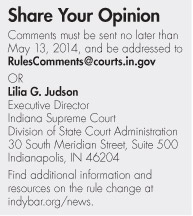Subscriber Benefit
As a subscriber you can listen to articles at work, in the car, or while you work out. Subscribe Now
 Appellate Rule 65 currently prohibits lawyers from citing or relying on the nearly 75 percent of Indiana Court of Appeals’ opinions issued as memorandum (not-for-publication) decisions. These opinions, however, are easily accessible on Lexis, Westlaw, and CaseMaker—and often provide helpful analysis when considering an issue.
Appellate Rule 65 currently prohibits lawyers from citing or relying on the nearly 75 percent of Indiana Court of Appeals’ opinions issued as memorandum (not-for-publication) decisions. These opinions, however, are easily accessible on Lexis, Westlaw, and CaseMaker—and often provide helpful analysis when considering an issue.
The Rules Committee of the Indiana Supreme Court has proposed changing this rule to allow citation of memorandum (non-for-publication) decisions as persuasive precedent. The proposed rule makes clear: “A party or attorney has no duty to cite a memorandum decision.” The new rule would not create additional work for lawyers. In many cases, lawyers will find and continue to rely on ample binding (published) authority. In cases without helpful controlling precedent, under the new rule, lawyers need not resort to other jurisdictions to find support, but instead may rely on relevant memorandum (not-for-publication) decisions within Indiana as persuasive precedent.
A task force of the Indianapolis Bar Association Appellate Practice Section crafted this proposal, which the executive committees of the Appellate Practice, Criminal Justice, and Litigation sections each respectively supported. The proposal was ultimately approved for submission to the Rules Committee by the IndyBar Board of Directors at its December 2013 meeting.
IndyBar members are encouraged to share your comments on the proposed rule. Feedback is essential to the Rules Committee and ultimately the Indiana Supreme Court justices in deciding whether to adopt a proposed rule or to make changes to the proposal. Without it, this rule will not be approved.
Comments can be short or lengthy. Consider beginning with an introduction of yourself (including years in practice and practice areas(s) before explaining your experience with the current rule and your reasons for supporting the change. You may wish to identify any specific instances where you have encountered and been unable to cite helpful memorandum decisions. Alternatively, a concise statement of your support for the rule will be valued.•
Please enable JavaScript to view this content.
